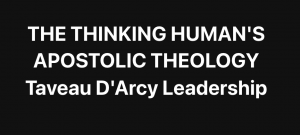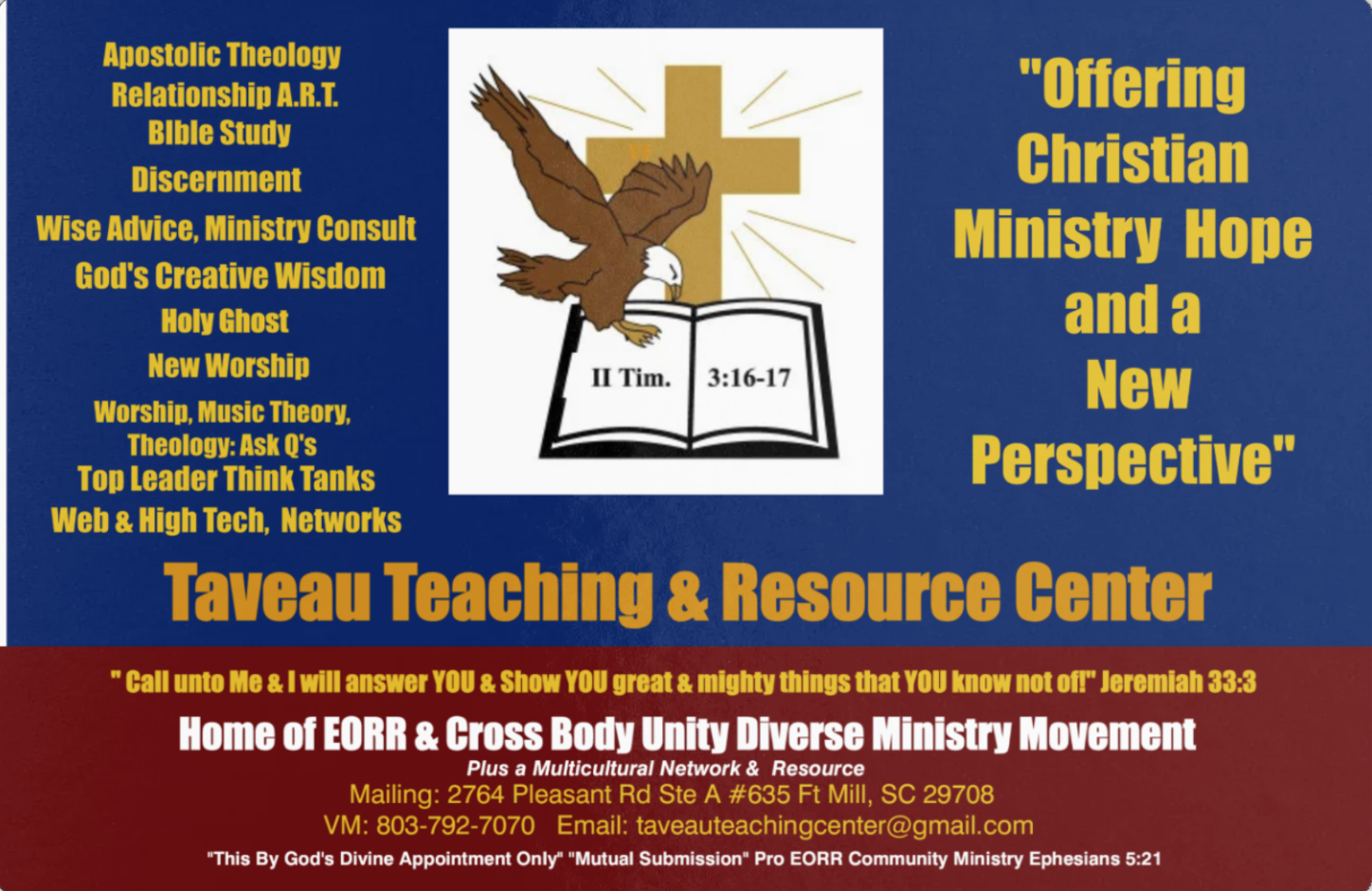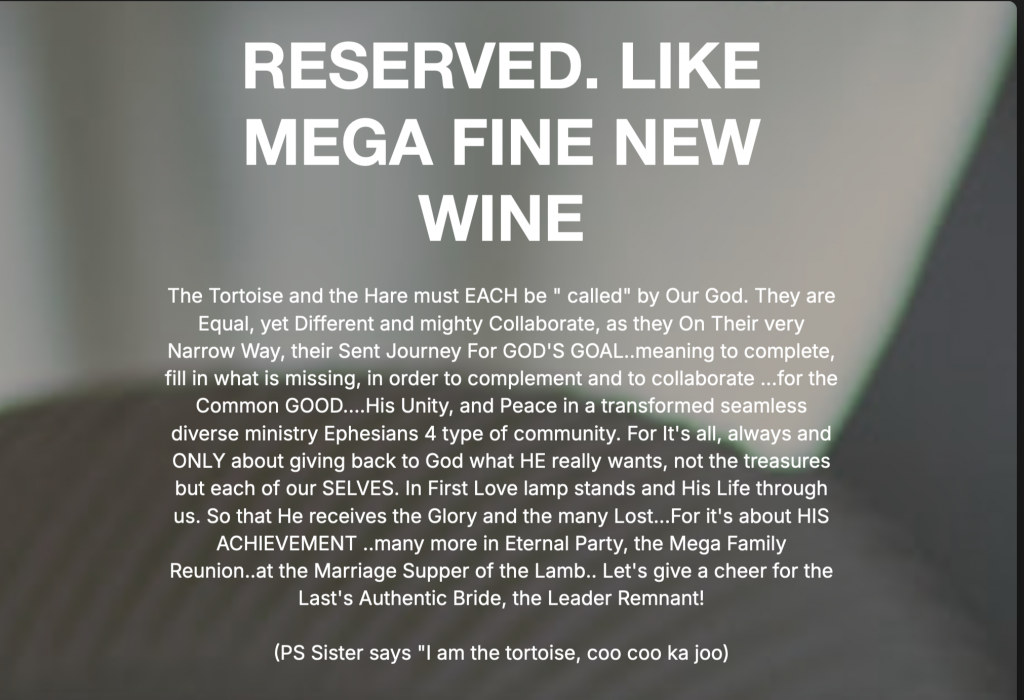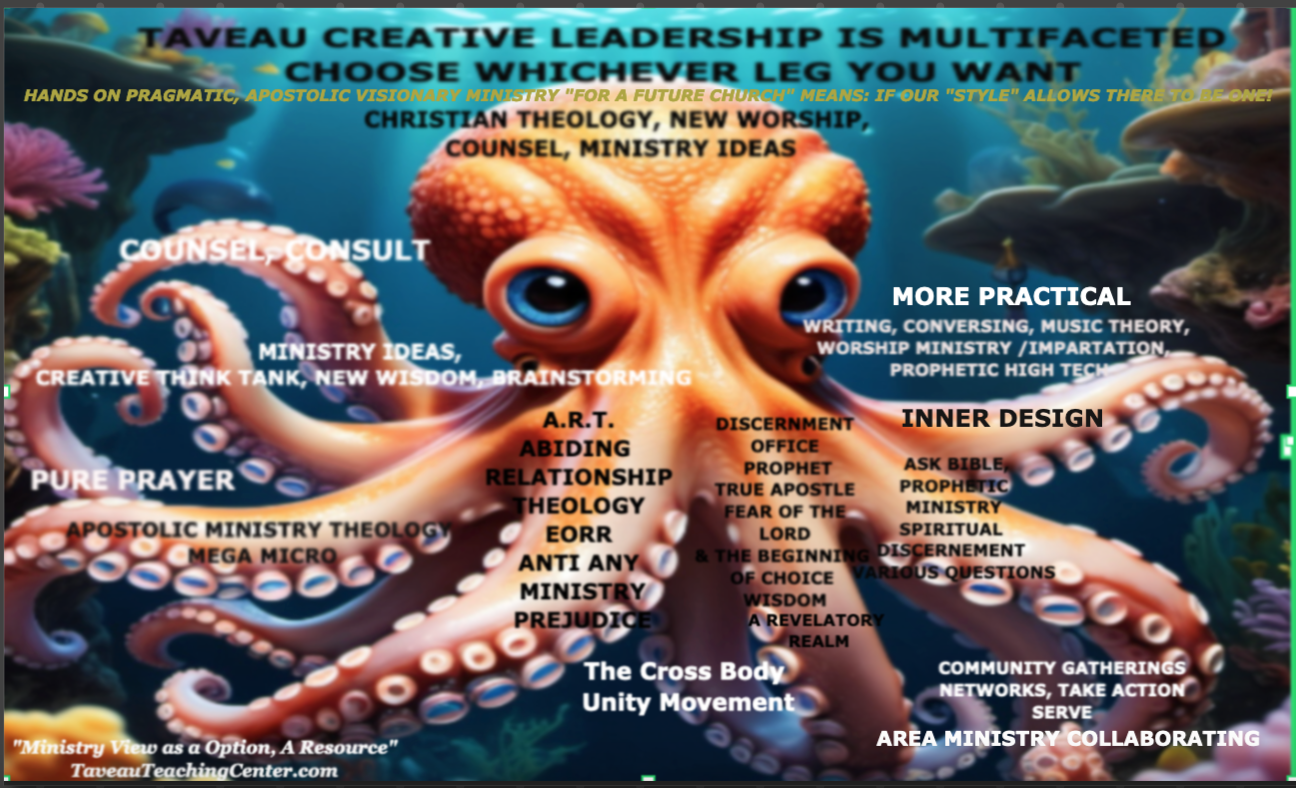
A.R.T. Abiding JAMES 3:17 Relationship Theology (It’s EORR)
E.O.R.R. Equal Opportunity REAL RESPECT for the Office of Every Human Made in God’s Image Psalm 139
(C)2024 Taveau D’Arcy All copyrights reserved under international copyright laws
Servant leader pastor Taveau first announced A.R.T. Abiding in James 3:17 Relationship Theology in 2017 while on assignment in DFW metroplex as a “stranger, alien” leader expat and experienced office (all 5 offices) sr minister also well trained human person, female.
At the core of every human heart lies A.R.T.—the Abiding Relationship Theology of each individual.
This represents how one relates to others and the world, either thoughtfully and respectfully or, at times, in darker, more manipulative ways.
Persons, Ministry A.R.T. varies:
* Sometimes, it’s caring, compassionate, and respectful, live enhancing A.R.T.
*Other times, it can be mean, mercenary, devious, or manipulative, even destructive, dark A.R.T.
In alignment with James 3:17, E.O.R.R. (Equal Opportunity REAL RESPECT) is a critical part of A.R.T.. E.O.R.R. affirms respect for the God-given dignity of every human being, reflecting Psalm 139—where all are made in God’s image, deserving honor and respect.

Taveau’s A.R.T. Perspective
“The wisdom that comes from above is first of all pure, peaceable, gentle, open to reason, full of mercy and good fruits, impartial, and sincere” — Apostle First Church, James 3:17
Taveau D’Arcy emphasizes that Christ, God’s only Son, did not come to win over a specific group of people or lost types. Instead, He sought out common, everyday, valuable real people, regardless of their backgrounds or walks of life.
Abiding in James 3:17 Relationship Theology and E.O.R.R. (Equal Opportunity REAL RESPECT for the Office of Every Human Made in God’s Image) reflects this truth. It calls for genuine respect for every person, whether they accept Christ as their personal Savior or not. This respect transcends race, gender, ideology, beliefs, and personal preferences. It’s about representing God’s love by offering sincere, impartial respect for the dignity inherent in every human being, as made in the image of God.
Taveau D’Arcy’s Abiding Relationship Theology (A.R.T.)
2. The Role of Self-Government (Galatians 5:23 personal fruit of the spirit ‘temperance, self control”)
Self-government refers to the ability to manage one’s own thoughts, emotions, and actions in a way that aligns with biblical teachings. This concept is crucial for maintaining control, especially under pressure. Practicing self-governance allows individuals to embody the qualities of James 3:17:
- Pure: Acting with integrity and moral clarity.
- Peaceable: Choosing peace over conflict in interactions.
- Gentle: Approaching others with kindness and consideration.
- Easy to be intreated: Being open to dialogue and understanding.
- Full of mercy: Showing compassion and forgiveness.
- Good fruits: Reflecting positive outcomes in behavior and relationships.
- Without partiality: Treating everyone with fairness.
- Without hypocrisy: Living authentically, aligning beliefs with actions.
Enlisting Power Through Self-Control
1. Valuing Others:
A critical aspect of self-control is valuing others. When individuals prioritize respect for others, it naturally encourages them to manage their reactions and behaviors. This commitment to valuing others can be a strong motivator for maintaining composure and grace, even in difficult circumstances.
2. Modeling James 3:17 Under Pressure:
In various life domains—personal, family, business, and ministry fellowship—the ability to model the qualities outlined in James 3:17 becomes vital. Here’s how individuals can apply this wisdom in challenging situations:
- Personal Life: When facing personal trials, relying on God’s wisdom can help maintain inner peace and clarity, enabling a person to respond gently rather than react impulsively.
- Family Dynamics: In family relationships, practicing self-control and demonstrating mercy can foster an environment of understanding and support, even when conflicts arise.
- Business Interactions: In the business realm, embodying peace and fairness can lead to healthier workplace dynamics and promote collaboration, especially when under stress.
- Ministry Fellowship: Within ministry contexts, applying these principles can help navigate disagreements with grace, ensuring that discussions remain constructive and focused on unity rather than division.
Conclusion
Abiding in a strong relationship with God empowers individuals to practice self-government and self-control, allowing them to embody the pure fruits of wisdom described in James 3:17. By valuing others and committing to these principles, individuals can model Christ-like behavior even when faced with significant pressure. This approach not only reflects personal integrity but also contributes to creating a positive, respectful atmosphere in all spheres of life, promoting healthy and meaningful relationships.

TD’S ABIDING IN EORR JAMES 3:17 A.R.T.
“But the wisdom that is from above is first pure, then peaceable, gentle, and easy to be intreated, full of mercy and good fruits, without partiality, and without hypocrisy.” James 3:17 KJV
Taveau D’Arcy’s Abiding Relationship James 3:17 Theology (A.R.T.) emphasizes the inherent dignity and respect owed to all individuals, grounded in the biblical understanding that every person is made in God’s image (Psalm 139). Her Christian ministry, EORR Cross Body Unity International, advocates for mutual RESPECT and equality across races, genders, and belief systems, whether one follows Christ or not. This approach reflects the belief that each person, as an image-bearer of God, deserves to be treated with honor and dignity.
Note: Extending “equal, significant, and valuable” respect to every individual does not require trust, agreement, or endorsement of their choices, nor does it mean they must reciprocate trust or agreement. Rather, this respect acknowledges the value of any person who is passionately and thoughtfully committed to their cause, recognizing that they are not lukewarm like many fellow believers.
In Taveau’s EORR Real Respect Position, she champions an egalitarian, Ephesians 5:21 “mutually submitted” approach to leadership within the Body of Christ. This model reflects a “chain of command” that respects boundaries, akin to abiding by the rules of a homeowner when visiting someone’s house. Taveau compares this to the peaceful dynamic seen in the old TV show Andy of Mayberry, where Sheriff Andy, Aunt Bea, Deputy Barney Fife, and the community abided by mutual respect, with Sheriff Andy holding the final say.
Taveau’s approach to leadership is non-authoritarian but persuasive. She shares Bible-based theology as an invitation to explore, rather than forcing rigid dogma. Her goal is to encourage each person to “study the Bible and hear God for themselves,” reflecting Philippians 2:12: “Work out your own salvation with fear and trembling.”
Her ministry respects Ephesians 4’s vision of a diverse, multicultural community that, when transformed by Christ, impacts broader society—a transformation greatly needed in today’s world. Over the years, Taveau has studied various church forms, divine gatherings, personal self-governance, and the freedom of individuals to attend ministries where they feel God’s leading. She offers an alternative ministry style, acknowledging the biblical warning of false leadership seen in the last days (2 Timothy 3:1-8, 1 Timothy 6:5), encouraging believers to “turn away” from corrupt influences.
Taveau’s servant leadership is modeled after Ephesians 4:1-4—exercising power and authority with humility, compassion, and enduring service. Her philosophy transcends Christian ministry, extending respect and value to strangers, expats, different generations, and those who do not follow Christ, as all are made in the image of God.

Memory of famous Indian Pacifist Mahatma Ghandhi
Mahatma Ghandhi was said to have commented,
“I might have accepted Jesus Christ as Savior had I not met so many of His people”
Deuteronomy 10:17
“For the Lord your God is God of gods, and Lord of lords, a great God, a mighty, and a terrible, which regardeth not persons, nor taketh reward.”
Acts 10:34
“Then Peter opened his mouth, and said, Of a truth I perceive that God is no respecter of persons.”
Mahatma Gandhi, the famous Indian pacifist and leader of India’s non-violent movement for independence, is often remembered for his deep spiritual beliefs and respect for various religions, including Christianity. One poignant story from his life sheds light on his view of Christians. Gandhi once sought to attend a Christian church in South Africa, but was turned away at the door because of his skin color. He was told that the church was for white people only.
This experience deeply affected him, and it is said that he later commented, “I might have accepted Jesus Christ as Savior had I not met so many of His people.” This quote reflects his disappointment with the hypocrisy of those who professed faith in Christ but did not practice the love, equality, and acceptance that Jesus preached. Despite his respect for Jesus and Christian teachings, Gandhi’s experience with Christians who practiced racial discrimination left a lasting impact on his view of following the Messiah, Christ.
This moment serves as a powerful reminder of the importance of aligning one’s actions with the values of love, compassion, and inclusion, which are at the heart of Jesus’ message.**
**The IFFM, Taveau Teaching Center, Taveau D’Arcy Creative Leadership, the EORR Cross Body Unity serve the fellow Christians by reminding each and every person, that Christ was born and raised, ministered and ploughed His Global Mission in the Middle East, for He was not a Caucasian, nor a Western European, (far off perceived as ‘enslaving’ ) “WE ARE THE WORLD” CENTRIC colonial.
This moment in Gandhi’s life is often seen as pivotal, shaping his perspective on Christianity. He deeply admired Christ’s teachings, especially the Sermon on the Mount, yet found that many Christians did not embody the radical compassion and inclusion Christ modeled. This experience influenced his commitment to non-violence, equality, and religious pluralism, forming the foundation of his philosophy in leading India’s fight for independence.
It’s a sobering reminder that the lived example of believers can have profound consequences on how faith is perceived, particularly in the context of racial and social justice. Gandhi’s disappointment in this instance also speaks to the broader responsibility of those who follow any faith: to live in a way that aligns with the core principles they profess, particularly when it comes to issues of human dignity and respect.

Also: This is a Human’s Ministry
We must be “other, outward Messiah centric”
Taveau D’Arcy’s teachings introduce the Office of the Human as a central theological concept, recognizing the sacredness of every individual life. This “office” acknowledges that every person has a unique, God-given purpose, regardless of their faith or beliefs. She extends this respect to all humanity, affirming the dignity of each person without coercion, domination, or judgment. Her Abiding JAMES 3:17 Relationship Theology emphasizes Christ’s model of unconditional, mature, and tough love—balanced with compassion and non-authoritarian engagement—whether someone follows Christ or not.
Dr T’s ministry teaches that being merciful, slow to anger, and peaceful does not mean compromising on biblical truth or adhering to political correctness. Instead, her approach calls for enduring Isaiah 1:18: “Come now, let us reason together; though your sins are like scarlet, they shall be as white as snow.” This means aligning with God’s Word while refusing to change or dilute the Holy Bible to please society. Rather, it requires a commitment to transforming ourselves, our methods, and our tone to reflect God’s heart.
Bestowing Dignity
By emphasizing the God-given dignity of every person, Taveau’s theology provides a framework for healing racial, social, and spiritual divisions. It fosters unity and reconciliation in both Christian and secular settings. This relational respect is foundational to her ministry, striving to build communities that value each person for their inherent worth, as God intended. Her vision seeks to bridge differences, elevating the human soul through mutual respect, while remaining rooted in the truth of Scripture.

Once Again:
Taveau D’Arcy’s theology emphasizes giving every God-formed individual equal, significant, and valuable Christlike respect. This doesn’t mean we must trust, agree with, endorse, or condone a person’s choices or beliefs—nor does it require them to trust or agree with us. Instead, this approach is rooted in genuine respect for each person’s ability to make their own choices and hear from God themselves.
No More Bible Beat Downs, Heavy Handed Open Reviling, Mocking
Taveau Teaching Center, Cross Body Unity leader movement rejects the idea of pressuring or manipulating others into faith. NO Bible thumping or coercion—because real respect honors each individual’s journey. While sharing Christ’s love and respect is important, it is done without force, shame, mental pressure, accusation, bias, or demeaning behavior. She stresses that the role of a believer is not to condemn or manipulate but to embody Christ’s love and leave the work of conviction to the Holy Spirit. WE ARE NOT TO BE GOD. That is Creator God, Invisible Holy Spirit’s pure work
Mature Respect for Each Other’s Reasoning
Taveau points to Philippians 2:12, where Apostle Paul instructs believers to “work out their own salvation with fear and trembling.” This highlights the importance of personal responsibility and individual spiritual growth. Each person’s relationship with God is their own business—and it is up to them to engage in that relationship freely, without external pressure. Through this lens, Taveau’s theology calls for mature reasoning and understanding, grounded in both love and respect, allowing the Holy Spirit to work in each person’s life on their own terms.

Leadership End Times ALL OUT Isaiah 1:18
Isaiah 1:18 is a powerful and well-known “Relationship Valuing“”humility” verse from the Book of Isaiah in the Bible, and it reads:
“COME now,(let’s relate, even negotiate: to hear both voices) and LET US REASON TOGETHER (inquire maturely, safely, respectfully), saith the Lord: though your sins be as scarlet, they shall be as white as snow; though they be red like crimson, they shall be as wool.” Isaiah 1:18 KJV
Explanation
- “Come now, let us reason together” –
RELATING as opposed to A MINISTRY ACCUSING: It shows office “respect” not fascist control. This Holy Spirit prophetic phrase is an invitation from God to His people to engage in dialogue and reflection. God is calling them to reason with Him, offering a chance for reconciliation. It implies that God is not distant or harsh, but approachable, willing to offer a path toward forgiveness and restoration. “calm negotian, hearing the others side” out of RESPECT for him, her, they, a “the office of the Human who is made in God’s Image and whom HE treasures, values and well loves.
- “Though your sins are like scarlet, they shall be as white as snow” –Nothing is too great or evil that God cannot restore:
The color scarlet symbolizes deep and glaring sin. Scarlet was a dye that was nearly impossible to remove, symbolizing the permanence of sin. However, God promises that despite the deep stain of sin, He has the power to cleanse it, making it as pure as snow. This signifies complete forgiveness and purification.
2. “Though they are red like crimson, they shall become like wool” –
Similar to the metaphor of scarlet, crimson also represents the severity of sin. Wool, like snow, is used to depict purity and innocence. Wool comes from sheep, and the Bible often compares God’s people to sheep and God as the Shepherd, further emphasizing the restoration to innocence and purity through God’s mercy and grace.
Theological Meaning
- God’s Mercy and Grace: The verse communicates that no matter how deep or severe the sins may be, God is willing to forgive and cleanse those who turn to Him. It speaks to the incredible mercy of God, who offers redemption to those who are willing to seek it.
- Repentance and Restoration: The invitation to “reason together” suggests that while God is offering forgiveness, it also requires repentance and acknowledgment of one’s sins. It is a call for people to face their wrongs and turn back to God, where they will find grace.
- A Path to Renewal: The imagery of sins becoming white like snow or wool indicates that God not only forgives but renews a person entirely, transforming their spiritual state to one of purity and righteousness.
Application
Isaiah 1:18 is to be respected and seen as a message of hope, offering a path to forgiveness regardless of the extent of one’s sin. It is a reminder of God’s willingness to engage with humanity, cleanse them of their sins, and restore their relationship with Him. The verse highlights both the gravity of sin and the immense grace available to those who seek God’s forgiveness

Taveau D’Arcy’s EORR/ A.R.T =s (authentic, ministry sincere) REAL Respect Theology emphasizes offering each person “Christ’s value and respect” as an image-bearer of God. However, this does not equate to agreeing with, endorsing, or condoning their choices or beliefs—or their endorsing, condoning, or agreeing with ours.
Real respect recognizes the inherent dignity of every person, regardless of whether they share the same faith, values, or worldview. This kind of respect is deeply rooted in Jesus’ example; He showed love and respect to all, even when He disagreed with or did not condone their actions.
In Taveau’s view, giving someone Christ’s REAL Respect is about valuing them as human beings created by God, not about approving their decisions or lifestyles. This respect does not imply that we should trust, endorse, or even agree with them. Nor does it demand that they reciprocate trust, agreement, or endorsement of our own choices or beliefs.
Respecting someone does not mean setting aside your own convictions; rather, it involves engaging with others in a way that reflects Christ’s love, even amidst differences. This kind of respect upholds personal boundaries, allowing room for disagreement without descending into demeaning, berating, or biasing against others, nor acting out with disrespect or judgment.
Instead, it respects the autonomy of others to hold their own views without requiring them to conform or agree with ours.

E.O.R.R./A.R.T in First Church Submission and Selective Ministry, Self Government
A.R.T. (Abiding Relationship Theology), as taught by Taveau D’Arcy, is grounded in each person’s endeavor to abide in personal self-government, as highlighted by the Apostle Paul in Galatians 5:22-23:
“But the fruit of the Spirit is love, joy, peace, longsuffering, gentleness, goodness, faith, meekness, temperance: against such there is no law.”
Additionally, it emphasizes the importance of “the wisdom from above” as described in James 3:17:
“But the wisdom that is from above is first pure, then peaceable, gentle, and easy to be entreated, full of mercy and good fruits, without partiality, and without hypocrisy.”
This Christian diverse theology stresses the vital responsibility of personal self-government—the calling for individuals to manage their own actions, thoughts, and behaviors in alignment with biblical principles through abiding in Christ. This involves cultivating the fruits of the Spirit, which embody the character of a mature believer who has chosen to walk in harmony with the Holy Spirit, practicing restraint and choosing righteousness over self-indulgence.
Taveau’s A.R.T. calls for each individual to take personal responsibility for their interactions with others, ensuring their conduct reflects Christ’s nature rather than being driven by impulsive emotions, selfish ambitions, or external pressures. This concept of self-government is deeply rooted in Paul’s teachings, encouraging believers to govern their inner lives through the empowerment of the Holy Spirit.
Furthermore, James 3:17 provides a framework for engaging with others. The wisdom that comes from above is described as “pure, peaceable, gentle, and easy to be entreated, full of mercy and good fruits, without partiality, and without hypocrisy.” According to Taveau’s theology, this wisdom is essential for navigating the complexities of human interactions. It necessitates humility, compassion, and an openness to dialogue, while steadfastly committing to truth and integrity.
Thus, Abiding Relationship Theology (A.R.T.)connects personal spiritual growth with relational dynamics. By developing the fruits of the Spirit and applying heavenly wisdom, individuals can foster healthy, respectful relationships without compromising their beliefs or values. This balanced approach ensures that one’s inner spiritual life is reflected in their outward interactions, promoting peace, harmony, and mutual respect within the community.
In summary, Taveau’s A.R.T. encourages abiding in Christ through self-government, undergirded by the character-building fruits of the Spirit, and practicing godly wisdom in every relationship—reflecting Christ in both personal life and social conduct.
This approach mirrors Christ’s many earthly relationships depicted in the Gospels: in Matthew, Mark, Luke, and John. We ought to read each individual earthly relationship and note how Jesus acted and reacted in each one. This occurred during the time when Jesus walked His assigned region—a vast, diverse, multicultural area—prior to His suffering and death on the cross and His victorious resurrection, establishing the organic First Church Front Lines ministry.

A.R.T. Practice: Training Imperfect Human Persons with “ART: EORR REAL RESPECT”
NOTE: Practical and Smart train your young persons and mostly instruct the modern PARENTS to do this before age 4..(This involves Sweet Baby Jesus love and Man Up Christ “hold them accountable, tough but kind, not debating, genuine Authority Love)
1. Read the Good News “Gospels” Matthew, Mark, Luke John
2. Search out each and every one of Jesus Christ’s area, family, personal, ministry “RELATIONSHIPS”
. Christ ‘relationships” mean: when He walked the earth in natural real life, interacting with His Mother Mary, many men and women, secular and Pharisees, Romans, children, saints, sinners, fallen human persons, and many more; (all of these which took place PRIOR to His Crucifixion on the rugged Cross ….and His victorious Resurrection)
2 NOTICE HOW Jesus Christ “ACTED” and “REACTED” in each relationship.
3. TO DO: Then we ACT and REACT like The Messiah, Christ.
Then the Christian Ministry, pure Community, each ambassador person… will regain a more respected, authentic and wholesome Winsome Name.’
(C) 2024 Taveau D’Arcy Creative Leadership All copyrights reserved under international copyright laws





